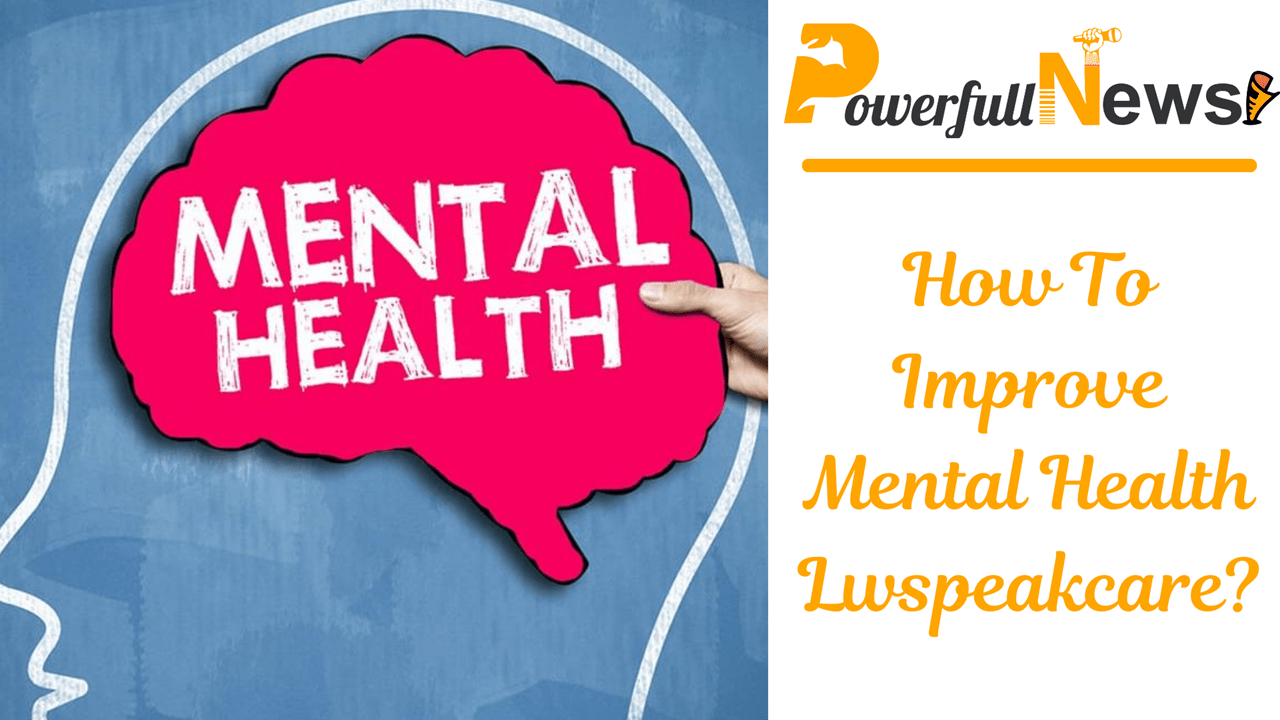Are you feeling overwhelmed or stressed or simply seeking to enhance your overall well-being? Look no further than this comprehensive guide on improving your mental health with the help of Lwspeakcare. Discover practical strategies and evidence-based techniques that empower you to take charge of your emotional well-being, build resilience, and cultivate a positive mindset.
LWSpeakCare offers a comprehensive approach to mental health improvement. Individuals can take significant steps toward well-being by fostering open communication about feelings, understanding mental health conditions, and seeking support from therapists or support groups.
From mindfulness practices to exercise routines and support systems to self-care strategies, we’ll explore a holistic approach to bettering your mental health and achieving a more fulfilling, balanced life.
Understanding the Importance of Mental Well-being
Mental health is a crucial aspect of overall well-being. When you prioritize mental health, you unlock a world of benefits that can positively impact every facet of your life. Understanding the importance of mental well-being is the first step toward achieving a more balanced and fulfilling existence.
The Impact of Poor Mental Health
Neglecting your mental health can have far-reaching consequences. Poor mental health can lead to decreased productivity, strained relationships, and even physical health problems. The impact of poor mental health can be overwhelming, making it crucial to address any mental health concerns promptly.
Benefits of Prioritizing Mental Health
On the other hand, prioritizing your mental health can lead to a wealth of positive outcomes. When you prioritize your mental well-being, you may experience improved mood, increased resilience, and enhanced overall well-being. The benefits of prioritizing mental health are far-reaching and can transform your life.
“Taking care of your mental health is not a luxury, it’s a necessity. Investing in your well-being can unlock a world of possibilities and help you live a more fulfilling life.”
Remember, your mental health is crucial. By understanding the impact of poor mental health and the benefits of prioritizing your well-being, you can take the first steps towards a happier, healthier, and more balanced life.
Developing a Mindfulness Practice
Mindfulness, the art of being fully present and attentive in the moment, can be a powerful tool for improving mental health. By cultivating mindfulness, you can better understand your thoughts, emotions, and physical sensations, allowing you to manage stress better, enhance focus, and foster emotional regulation.
One of the most accessible mindfulness techniques is meditation. By sitting quietly and focusing on your breath, you can train your mind to let go of distractions and be fully present. Start with a few minutes each day and gradually increase the duration as you become more comfortable with the practice.
Incorporating mindfulness into your routine can profoundly impact your mental health. Whether you meditate, practice breathwork, or be more present in your daily life, the benefits of mindfulness practice can include reduced stress, improved focus, and greater emotional regulation. Experiment with different mindfulness techniques to find what works best for you, and witness the mental health benefits of mindfulness firsthand.
Incorporating Exercise into Your Routine
Regular physical activity is a powerful tool for improving your mental health. Whether it’s aerobic exercise, strength training, or mind-body practices like yoga, incorporating exercise into your daily routine can profoundly impact your emotional well-being.
Types of Exercise for Mental Health
From brisk walking and cycling to swimming and dancing, there are countless ways to get your body moving and boost your mood. Strength training exercises, such as weightlifting or bodyweight workouts, can also help reduce symptoms of anxiety and depression by releasing endorphins and improving self-confidence.
Mind-body exercises like yoga, Tai Chi, and Pilates can be particularly beneficial for those seeking a more holistic approach. These practices combine physical movement with breath work and meditation, helping to alleviate stress and cultivate a sense of inner calm.
Finding an Exercise You Enjoy
The key to making exercise a sustainable part of your lifestyle is finding an activity you genuinely enjoy. Whether hiking in nature, playing a team sport, or trying a new dance class, choosing an exercise that aligns with your interests and preferences will make it much easier to stick to a consistent routine.
Experiment with different options, and don’t be afraid to try new things. The more you can find ways to make exercise fun and engaging, the more likely you’ll be to reap its mental health benefits.
Building a Support System
Maintaining strong social connections is crucial to supporting your mental health. Reaching out to friends, family, and loved ones can provide a sense of belonging and help you feel less isolated. Building a support system allows you to access the emotional and practical assistance you need during difficult times.
Connecting with Friends and Family
Regular connection with friends and family can profoundly impact your mental well-being. Make an effort to schedule regular check-ins, whether a weekly video call, a monthly brunch, or a quarterly weekend getaway. These interactions foster a sense of social support for mental health and allow you to share your thoughts, feelings, and experiences with people who care about you.
If you find it challenging to maintain these connections, start small. Reach out to a close friend or family member and suggest a simple activity, such as a coffee date or a walk in the park. Building a support system doesn’t have to be complex; it’s about making the time and effort to nurture the relationships that matter most to you.
How To Improve Mental Health Lwspeakcare?
Lwspeakcare is dedicated to providing comprehensive mental health resources and support services to help you improve your overall well-being. Whether you’re struggling with stress, anxiety, or depression or want to prioritize your mental health, Lwspeakcare has the tools and expertise to guide you on your journey to better mental wellness.
From licensed mental health professionals to supportive online communities, Lwspeakcare offers a wide range of Lwspeakcare mental health services to cater to your unique needs. Access personalized counseling, join peer-led support groups, or explore educational resources that empower you to improve mental health lwspeakcare.
Lwspeakcare understands that everyone’s path to mental health is different, so they curate diverse lwspeakcare mental health resources. Discover mindfulness techniques, stress management strategies, and healthy coping mechanisms tailored to your preferences and lifestyle. With Lwspeakcare, you’ll have the support and tools to control your mental well-being.
“Lwspeakcare has been a game-changer for my mental health. The resources and support they provide have truly made a difference in my life.”
So, whether you seek professional guidance, a supportive community, or practical strategies to enhance your mental health, Lwspeakcare is here to help. Embark on your path to better mental well-being with the reliable and compassionate resources this dedicated organization offers.
Practicing Self-Care Strategies
Taking care of your mental health is crucial, and self-care should be a top priority. Incorporating various self-care strategies can boost your overall well-being and resilience. One essential self-care practice is prioritizing relaxation and rejuvenation.
Prioritizing Relaxation and Rejuvenation
Relaxation techniques can help you unwind, reduce stress, and recharge your mental and emotional batteries. Try incorporating mindfulness exercises, such as deep breathing or progressive muscle relaxation, into your daily routine. These practices can help you stay present, calm your mind, and foster a greater inner peace.
Equally important is allowing yourself time for rejuvenating activities. Ensure you get enough sleep, which is crucial for cognitive function and emotional well-being. Engage in hobbies or leisure pursuits that bring you joy and a sense of fulfillment. Taking breaks throughout the day, even for a few minutes, can help you recharge and approach your tasks with renewed energy and focus.
Remember, self-care is not a one-size-fits-all approach. Experiment with different self-care strategies, relaxation techniques, and rejuvenation practices to find what works best for you. By prioritizing your mental health and regular self-care, you can cultivate a greater sense of balance, clarity, and overall well-being.
Seeking Professional Help
When it comes to improving your mental health, sometimes seeking professional help can be the most effective approach. Various types of mental health professionals, each with their own expertise and therapeutic approaches, can provide the support and guidance you need.
Types of Mental Health Professionals
Therapists and counselors are trained to help individuals navigate a wide range of emotional and mental health challenges. They often use talk therapy techniques to help you explore your thoughts, feelings, and behaviors and develop coping strategies. Psychologists, on the other hand, have advanced training in the science of the mind and can provide more in-depth assessment and treatment for mental health conditions.
For individuals with more severe or complex mental health concerns, such as clinical depression or anxiety disorders, a psychiatrist may be the best option. Psychiatrists are medical doctors who can prescribe medication in addition to providing therapy.
| Mental Health Professional | Qualifications | Specialties |
|---|---|---|
| Therapist/Counselor | Master’s degree in counseling or psychology | Talk therapy, coping strategies, emotional support |
| Psychologist | Doctoral degree in psychology | Psychological assessment, evidence-based therapies |
| Psychiatrist | Medical degree, specialized training in psychiatry | Medication management, therapy, and treatment of mental health disorders |
When it comes to seeking professional help for your mental health, the most important thing is to find a provider who is the right fit for your specific needs and preferences. Take the time to research your options, and don’t be afraid to try different therapists or approaches until you find what works best for you.
Adopting Healthy Coping Mechanisms
Navigating mental health challenges can be daunting, but developing effective coping strategies is essential for your well-being. Whether you’re seeking to manage stress, anxiety, or any other mental health concern, there are a variety of healthy coping mechanisms you can explore and incorporate into your daily life.
One powerful tool is journaling. By regularly putting pen to paper, you can process your thoughts and emotions, identify patterns, and gain a deeper understanding of yourself. Mindfulness practices, such as meditation or deep breathing exercises, can also be immensely beneficial in helping you stay present and grounded during difficult times.
Physical activity is another important stress management technique. From taking a brisk walk to engaging in a favorite sport or workout routine, exercise can release endorphins, improve mood, and provide a much-needed outlet for pent-up energy or frustration.
Cultivating Resilience and Positivity
Building resilience and maintaining a positive mindset are essential for overall mental well-being. By learning to reframe negative thoughts and celebrate small victories, you can navigate life’s challenges with greater ease and find joy in the everyday.
It’s natural to have negative thoughts when faced with adversity. However, by consciously reframing these thoughts, you can transform them into more empowering perspectives. Whenever a negative thought arises, take a moment to ask yourself, “How else can I look at this situation?” Seek alternative, more constructive ways of thinking to help you move forward with a sense of hope and optimism.
Conclusion
In pursuing better mental health, it’s important to acknowledge and celebrate small victories, no matter how insignificant they may be. Whether it’s completing a daily task, practicing a new coping technique, or simply taking a moment to appreciate the beauty around you, recognizing these achievements can boost your self-confidence and reinforce your progress.
By embracing a positive mindset, you’ll cultivate the resilience needed to weather life’s storms and emerge stronger than before.
FAQs About Mental Health
What is the importance of mental well-being?
Mental well-being plays a crucial role in overall health and quality of life. Neglecting it can lead to decreased productivity, strained relationships, and physical health problems. Prioritizing it, on the other hand, can provide benefits such as improved mood, increased resilience, and enhanced overall well-being.
How can I develop a mindfulness practice?
Cultivating a mindfulness practice can be highly effective in improving your mental health. Meditation, breathwork, and present-moment awareness can help reduce stress, enhance focus, and foster emotional regulation. Incorporate mindfulness into your daily routine to harness its power.
What types of exercise are best for mental health?
Various forms of exercise, including aerobic activities, strength training, and mind-body practices like yoga, can positively impact your emotional well-being. The key is to find an exercise routine that you genuinely enjoy, as this will make it more sustainable in the long run.
How can I build a strong support system?
Maintaining meaningful relationships with friends, family, and loved ones is crucial for your mental health. Reach out, strengthen connections, and foster a sense of community, as a strong support system can contribute greatly to your overall emotional well-being.
What mental health resources and services does Lwspeakcare offer?
Lwspeakcare is dedicated to providing comprehensive mental health resources and support services to help you improve your well-being. This includes access to licensed professionals, support groups, and educational materials to assist you in your journey to better mental health.
What self-care strategies can I incorporate?
Self-care is essential for maintaining good mental health. Incorporate relaxation techniques like mindfulness, deep breathing, and progressive muscle relaxation into your routine. Additionally, engage in rejuvenating activities such as getting enough sleep, pursuing hobbies, and taking breaks to recharge.
When should I seek professional help for my mental health?
Seeking professional help may be necessary if you’re struggling with mental health challenges. Various types of mental health professionals, including therapists, counselors, psychologists, and psychiatrists, can provide the appropriate support and therapy options to address your specific needs.
What are some healthy coping mechanisms for mental health?
Developing effective coping mechanisms is crucial for managing mental health challenges. Healthy strategies include journaling, practicing mindfulness, engaging in physical activity, and seeking social support. Identify your personal stressors and implement coping techniques that work best for you.
How can I cultivate resilience and a positive mindset?
Resilience and a positive mindset are key to maintaining good mental health. Reframe negative thoughts, practice gratitude, and celebrate your small victories. These strategies can contribute to your overall emotional well-being and help you navigate life’s challenges with greater ease.




